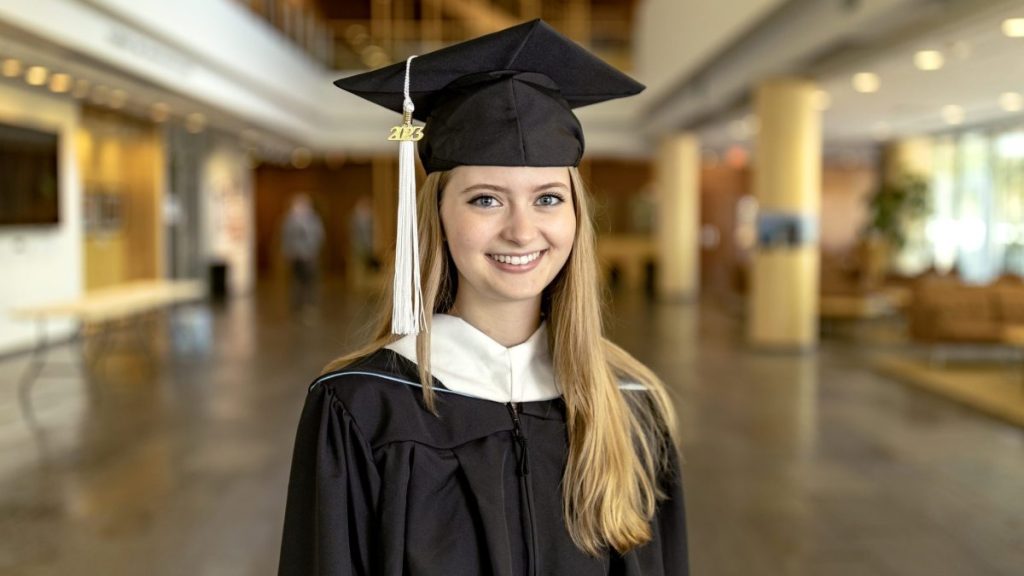Kat Goodpaster’s was raised to prioritize serving your country in any way you can. At Carolina, the Tar Heel learned to combine her passion for Russian culture and national security for a future career.

Like all kids growing up, Kat Goodpaster’s grasp of language was developed at home with her parents.
But in the Goodpaster household, that language was commonly changing. The daughter of a career special forces solider and a mother with a knack for picking up new languages, the family always added in a new language at home.
One language in particular stuck for the Fayetteville, North Carolina, native: Russian.
“It started with my dad because he learned Russian for the military, so he would come home, and he would speak it, and he was very encouraging of us to be into global politics and learning languages,” Goodpaster said. “I thought that because of its importance to national security, and personally, I think it’s a beautiful language, I picked it up and stuck with it.”
That passion for the language first led her to minor in Russian as an undergrad at Carolina and now to a master’s degree in global studies with a concentration in Russia and Eastern Europe. Goodpaster will be among the more than 1,690 Tar Heels who earn their master’s degrees at Commencement on Sunday.
Preparing for her future career
Goodpaster’s father instilled more in his daughter than just a passion for language and global politics. He also passed down a conviction of serving your country. When it came to determining a career path, she kept that message in mind.
“He always prioritized serving your country in whatever way you can,” she said. “For me, I have this sense of understanding because of him. It felt like this was the best way that I could help the community because of my existing knowledge.”
Her first step toward that career was a semester abroad in Russian as a high schooler, where she was part of an immersive Russian language program that helped both hone her language skills and learn more about the country’s culture.
Goodpaster’s next step was to enroll in the peace, war and defense program in Carolina’s College of Arts and Sciences while also minoring in Russian.
“I already knew I wanted to do government work. I’ve been very into the idea of diplomacy,” she said. “Carolina definitely provided me the space to explore that. My favorite class was Professor Erinn Whitaker’s ‘Intro to Intel Analysis.’ It was a course on how to write and was incredibly informative and incredibly helpful. It developed these concrete skills that I can use and allowed me to explore that potential career field.”
But because most positions in the federal government require applicants to be 21 years old, graduating with her bachelor’s in 2021 at just 19 years old required her to put a pause in her larger plans. Though she welcomed the reason to add more years in Chapel Hill.
“I knew I was likely going to pursue more education just to wait out that time, so I was on that path,” Goodpaster said. “But I will say Carolina is my favorite place. I love being here. I love being a Tar Heels. Being at Carolina and the Russian department really pushed me to stay here to go to grad school.”
A double Tar Heel
While pursuing her master’s in global studies, Goodpaster continued to entrench herself in the College’s Russian department, both working and studying with the faculty and staff. Her graduate research has focused on Russia’s use of conspiracy theories in the war with Ukraine.
“I’m looking at what the Russian government is saying about the invasion: why they did it, what are these threats they’re trying to stop, and then looking at how they’re using surveillance and social media to control the people,” she said. “My research is arguing that these conspiracy theories are building on these fears that the government has built and that it’s different than just disinformation, which is purely false because conspiracy theories have some truth, and that’s what makes them effective.”
The research allowed Goodpaster to tie together her understanding of Russian culture, the language and national security to provide context to a complex, ever-changing situation.
Being able to combine all these aspects, she said, is a testament to the Russian department.
“When I started at Carolina, I would say the department was pretty small, but it has grown rapidly,” she said. “It’s really amazing because even though it has grown, it’s still really tight-knit. The faculty is amazing. They’re incredible. My skills have grown so much from them.”
She helped play a role in the growth while in grad school, serving as the program associate for the UNC Russian Flagship Program, which launched in 2020 with funds from the Department of Defense’s Flagship Language Program to allow Tar Heels of any academic background to intensively study the Russian language and participate in professional development programming tailored to each student.
All of those experiences, Goodpaster said, have her feeling confident that she’s ready for wherever a career in national security takes her.
“My time here at Carolina, my time with the flagship program, really prepared me. It’s prepared me to think critically,” she said. “It’s prepared me for understanding the world, understanding Russian culture, understanding national security.”
She’s also eager to call herself a double Tar Heel.
“I remember graduating with my bachelor’s and being so excited,” she said. “So graduating with my master’s and bachelor’s from here — I just don’t know. We have this reputation, and I get to claim to be part of it, and that means so much.”
By Brandon Bieltz, University Communications
